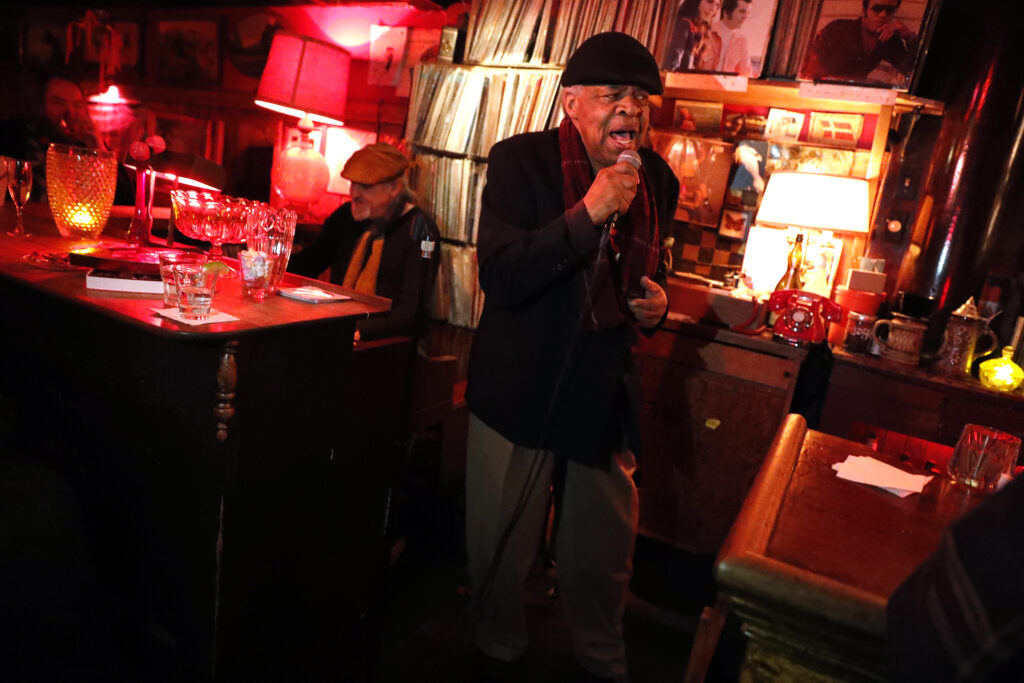
For Cheryl Fabio, it’s not the body count that takes her breath away.
In the five years since the release of “Evolutionary Blues: West Oakland’s Music Legacy,” the filmmaker has watched as musicians she interviewed for the documentary have died, one after another, often exiting the scene with little or no fanfare. The stark generational transition speaks to the point of her film, which seeks to recognize the legacy of underappreciated Black artists who made outsize contributions to funk, jazz, gospel, blues and R&B (which is to say, the postwar American soundtrack).
“Wylie Trass, John Turk, Robert Hartfield, Dalhart Johnson, Sonny Rhodes, and just recently Marvin Holmes and Freddie Hughes. I counted at least eight people directly from the film who have passed since it premiered in 2017,” she told The Chronicle. “These men didn’t get their flowers when they were alive, and they’re not getting them now.”

Available for viewing or streaming free from theOakland Public Library, “Evolutionary Blues” planted several seeds in 2017 that have since taken root. Veteran Oakland drummer, songwriter and producer Paul Tillman Smith, who’s also interviewed in the film, recently released “The Sounds of Oakland,” an album “that was inspired by Cheryl Fabio’s documentary,” he said.
He spent several years mustering a multigenerational cast of Oakland artists for a series of recording sessions that included some of the departed “Evolutionary Blues” musicians who defined the scene in the 1950s and 60s. Many of the players featured on “The Sounds of Oakland” are still vital, like trombonist Danny Armstrong, vocalist Lenny Williams, pianist/vocalist Lady Bianca, drummer Larry Vann and guitarist Johnny Talbot, whose seminal funk band De Thangs bridged West Oakland’s Seventh Street scene with Bill Graham’s Fillmore empire.
“I grew up playing country and western,” Talbot told The Chronicle as he was leaving the funeral for Marvin Holmes, another foundational figure in Oakland funk who first made his mark with his band the Uptights. “We didn’t have a Black radio station where I was raised in Texas. So when I came out here I’d get people jumping and shouting, and I might be playing something by Hank Williams, but with that church feeling. Some of the elders would get upset, saying ‘He’s crossing up the spirit again.’”

Tillman并不是唯一的音乐家加班to celebrate a scene that’s rapidly receding. East Bay harmonica player Mark Hummel has organized a tribute to Texas-reared blues guitarist Sonny Rhodes at Yoshi’s on Monday, March 14, featuring more than a dozen musicians, with guitarist Chris Cain and vocalist Curtis Salgado headlining (the concert is a fundraiser for Rhodes’ widow, Annie Rhodes).
“Paris Slim is flying in from Paris,” Hummel said. “Sonny was a huge influence on him. Almost everybody on the program has played with Sonny.”
Rhodes, who died on Dec. 14 at the age of 81, is one of the artists featured on Hummel’s new album, “East Bay Blues Vaults: 1976-88,” an anthology that gathers tracks recorded by small independent blues labels. Like Talbot, Rhodes (a.k.a. Clarence Smith) was born in Texas and came west as part of the Great Migration.
He had already paid dues with established acts like Freddie King and Junior Parker when he settled in Fresno in the mid-1960s. Before long, Rhodes was drawn to Oakland, where his incendiary guitar work and powerful vocals attracted the attention of Galaxy, the blues/R&B imprint of Berkeley-based Fantasy Records. In the 1980s Rhodes reinvented himself as a lap steel guitarist, and became a regular on the East Bay corridor of working-class Black blues joints from Oakland to Richmond like the Playboy Club, Eli’s Mile High Club and Deluxe Inn.
He faced the same challenges as his kindred Oakland artists in soul and R&B, namely a lack of local resources. “There were only a few labels here, Galaxy and Bob Geddins on the blues side,” Hummel said. “After Galaxy disappeared, there really weren’t soul labels of any size. We never had a Stax, or Motown, or Philadelphia International. If you didn’t end up on a major label, you were basically screwed.”
Hummel worked closely with San Jose guitarist and recording engineer Kid Andersen to master the album, creating a cohesive sound from all the different sources. While Andersen’s Greaseland Studios has become an essential hub in the Bay Area blues scene, Oakland continues to produce genre-defining artists, like vocalist Terrie Odabi, who received her third consecutive Blues Music Awards nomination for best soul blues female artist last month (winners are announced May 5 in Memphis).

Last week, former Santana vocalist Tony Lindsay’s album “Soul Soldier” won soul album of the year in the Independent Artists Awards. But for Fabio, the race to recognize artists before they face their last curtain call keeps hitting infuriating roadblocks.
“We’re not valuing our artists who gave us so much,” she said. “These were all hardworking, good guys. Many of them went through some trouble, but the final blow was all the clubs going away. People ask, can’t it be rebuilt? No. When that’s gone, it’s gone forever. This film is about a point in history, a story about migration, desegregation and struggling to make a better world.”
Sonny Rhodes Memorial Benefit:8 p.m. Monday, March 14. Yoshi’s, 510 Embarcadero West, Oakland. $40. 510-238-9200.www.yoshis.com.
